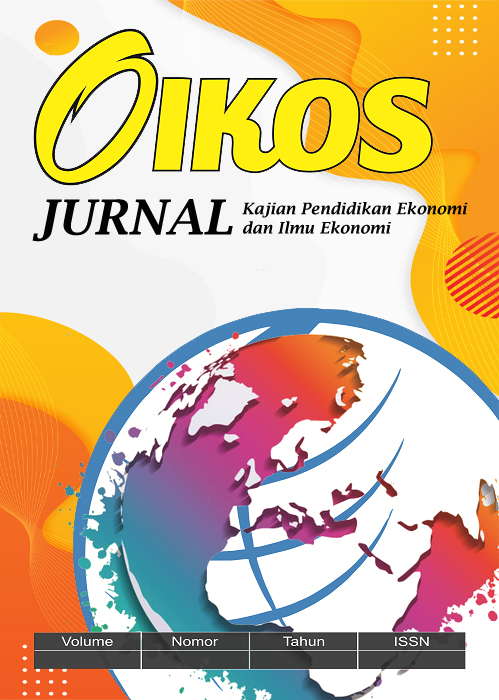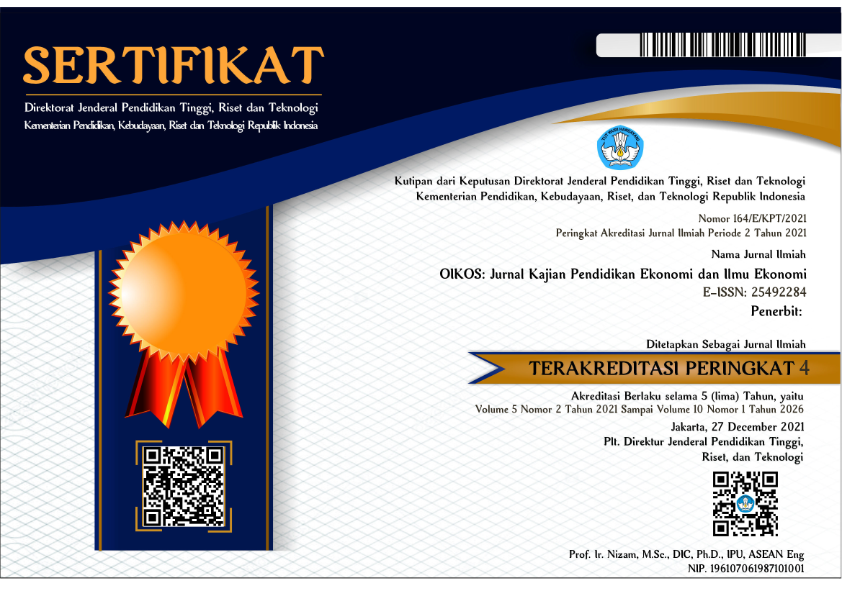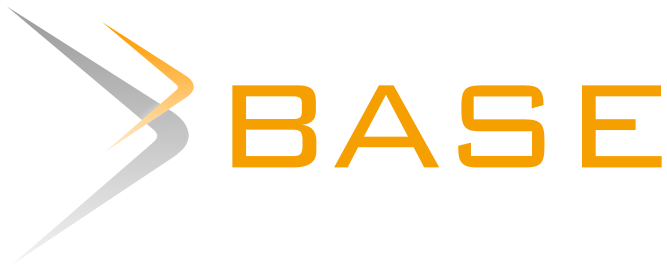THE EFFECT OF DIGITAL LITERACY MEDIATION ON THE INFLUENCE OF TEACHER COMPETENCE ON STUDENT LEARNING OUTCOMES
Keywords:
Digital Literacy, Teacher Competence , Learning OutcomesAbstract
Student learning outcomes in the cognitive domain are dominated by achievements below the Minimum Completion Criteria (KKM) and the inconsistency of previous research results is the background of this study. The purpose of this study is to determine the effect of teacher competence on student learning outcomes and to determine the effect of digital literacy on the influence of teacher competence on learning outcomes. The research method used is an explanatory method using questionnaires and documentation in data collection. The data analysis technique uses a causal step strategy. The results of the study indicate that teacher competence has a positive effect on student learning outcomes and digital literacy mediates the effect of teacher competence on student learning outcomes
Downloads
References
A Sahertian, P. (1994). Profil Pendidikan Profesional. Andi Offset.
Abbas, Q., Hussain, S., & Rasool, S. (2019). Digital Literacy Effect on the Academic Performance of Students at Higher Education Level in Pakistan. Global Social Sciences Review (GSSR), 4(1), 108–116.
Akhyar, Y. et. al. (2021). Contribution of Digital Literacy to Students’ Science Learning Outcomes in Online Learning. International Journal of Elementary Education, 5.
Amara NWANKWO, C. (2021). Teachers’ Competence, Motivation as Correlates of Senior Secondary School Students’ Academic Achievement in Economic in Imo State. Journal of Educational Research on Children, Parents & Teacher, 2(1), 158–168.
Arima, M. T., Amaliyah, N., Abustang, P. B., & Alam, S. (2021). Pengaruh Literasi Digital terhadap Hasil Belajar Siswa SD Inpres Bangkala III Kota Makassar. Jurnal Pendas Mahakam, 6(2), 105–110.
Barron, R. M., & Kenny, D. A. (1986). The Moderator-Mediator Variable Distinction in Social Psychological Research: Conceptual, Strategic, and Statistical Considerations. Journal of Personality and Social Psychology, 51(6), 1173–1182.
Bloom, B. S. , etc. (1956). Taxonomy of Educational Objectives : The Classification of Educational Goals, Handbook I Cognitive Domain. Longmans, Green and Co.
Bogo, N. J. , E., & Aperocho, M. D. B. (2023). Teachers’ Profile as Predictor of Teaching Competence and Students’ Academic Achievement in Science. EPRA International Journal of Multidisciplinary Research, 9(2), 194–201.
Chalkiadaki, A. (2018). A Systematic Literature Review of 21st Century Skills and Competencies in Primary Education. International Journal of Instruction, 11(3), 1–16.
Dalyono, M. (2007). Psikologi Pendidikan. Rineka Cipta.
Devi, S. S. , & Rafsanjani, M. A. (2021). Pengaruh Kompetensi Profesional Guru dan Gaya Mengajar Guru Terhadap Hasil Belajar Pada Mata Pelajaran Ekonomi. Jurnal Pendidikan Ekonomi (JUPE), 90–95.
Fauth, B., Decristan, J., Decker, A. T., Büttner, G., Hardy, I., Klieme, E., & Kunter, M. (2019). The effects of teacher competence on student outcomes in elementary science education: The mediating role of teaching quality. Teaching and Teacher Education, 86. https://doi.org/10.1016/j.tate.2019.102882
Gagne, R. M. (1970). The Conditions of Learning. The Florida State University.
Gagne, R. M. (1985). The Cognitive Psychology of School Learning. Little, Brown and Company.
Gilster. (1997). Digital Literacy. Wiley.
Hakim, A. (2015). Contribution of Competence Teacher (Pedagogical, Personality, Professional Competence and Social) On the Performance of Learning. The International Journal Of Engineering And Science (IJES), 4(2), 1–12. www.theijes.com
Haslinda. (2019). Classical Conditioning. Jurnal Ilmu Komunikasi Network Media, 2(1).
He, T., Huang, Q., Yu, X., & Li, S. (2020). Exploring students’ digital informal learning: the roles of digital competence and DTPB factors. Behaviour and Information Technology, 1–11.
Hikmah, N. (2018). Pengaruh Kompetensi Guru dan Pengetahuan Awal Siswa terhadap Motivasi Belajar dan Implikasinya terhadap Hasil Belajar Ekonomi Siswa. Indonesian Journal Of Economics Education, 1(1), 9–16.
Hilmiatussadiah, K. G., Ahman, E., & Disman. (2024). Teacher Competency: Descriptive study of Guru Penggerak. Inovasi Kurikulum, 21(1), 149–162.
Inayah, R. (2013). Pengaruh Kompetensi Guru, Motivasi Belajar Siswa, dan fasilitas Belajar Terhadap Prestasi Belajar Mata Pelajaran Ekonomi pada Siswa Kelas XI IPS SMA Negeri 1. Jurnal Pendidikan Insan Mandiri.
Istiqomah, A. N., Suyatno, S., & Maryani, I. (2019). The Effect of Teacher Competencies on Student Achievement in Vocational High School. International Journal of Education, 11(4), 1. https://doi.org/10.5296/ije.v11i4.15625
Jentsch, A., & König, J. (2022). Teacher Competence and Professional Development. In International Handbook of Comparative Large-Scale Studies in Education (pp. 1167–1183). Springer Cham.
Jones, R. H., & Hafner, C. A. (2012). Understanding Digital Literacies: A practical introduction. Routledge.
Kajin, S. (2018). Pengaruh Pembelajaran Berbasis Literasi Digital Terhadap Motivasi Dan Hasil Belajar Kognitif di MTs N Mojosari dan MTs N Sooko Mojokerto. PROGRESSA: Journal of Islamic Religious Instruction, 133–142.
Kioupi, V., & Voulvoulis, N. (2019). Education for Sustainable Development: A Systemic Framework for Connecting the SDGs to Educational Outcomes. Sustainability.
Lestari, S. (2023). Pengaruh Kompetensi Guru Terhadap Prestasi Belajar Siswa (Survei Pada Mata Pelajaran Ekonomi Kelas XII MA Ma’Arif NU Cimanggu Kabupaten Cilacap). JIPPSI: Jurnal Ilmu Pendidikan Dan Psikologi, 1(1), 32–37.
Lingga, R. A., Andriani, D. N., & Wirawan, Y. R. (2022). Pengaruh literasi digital terhadap hasil belajar mahasiswa Gen-Z di masa pandemi COVID-19. Senassdra, 1, 87–96.
Muhardi, M. (2004). Kontribusi pendidikan dalam meningkatkan kualitas bangsa indonesia. MIMBAR: Jurnal Sosial Dan Pembangunan, 20(4), 478–492.
Mukhtar, A., & MD, L. (2020). Pengaruh Kompetensi Guru Terhadap Kinerja Guru Dan Prestasi Belajar Siswa Di Kota Makassar. Jurnal Idaarah, IV(1).
Pandey, A., & Kumar, A. (2020). Relationship between teachers’ teaching competency and academic achievement of students. International Journal of Applied Research, 6(7), 31–33. www.allresearchjournal.com
Pangrazio, L. (2016). Reconceptualising critical digital literacy. Discourse, 37(2), 163–174. https://doi.org/10.1080/01596306.2014.942836
Podungge, R., Rahayu, M., Setiawan, M., & Sudiro, A. (2020). Teacher Competence and Student Academic Achievement.
Priansa, D. J. (2014). Perencanaan & Pengembangan SDM. Alfabeta.
Purwanto. (2014). Evaluasi Hasil belajar. Pustaka Pelajar.
Purwanto, M. N. (2000). Psikologi Pendidikan. PT. Remaja Rosdakarya.
Putri, S. A., & Dewi, R. M. (2022). Pengaruh Literasi Ekonomi dan Literasi Digital Terhadap Prestasi Belajar Pada Mata Pelajaran Ekonomi Siswa Kelas XE3 SMA Negeri 3 Sidoarjo di Masa Pandemi Covid-19. Jurnal Pendidikan Ekonomi (JUPE), 10(2), 139–147.
Qudsiyah, M., & Nurhasanah, E. (2021). Pengaruh Literasi Digital Terhadap Hasil Belajar Ekonomi Di Era Pandemik Covid-19 Siswa Kelas XI SMA Negeri 6.
Rasyid, A. (2015). Effects of Ownership Structure, Capital Structure, Profitability and Company’s Growth Towards Firm Value. International Journal of Business and Management Invention, 4, 25–31.
Sagala, S. (2011). Kemampuan Profesional Guru dan Tenaga Kependidikan. Alfabeta.
Sagitaa, D. D., Asni, N. F., Fitniwilis, burhendi, F. C. A., & Siswanto, R. D. (2019). Students’ digital literacy skill to solve learning problems. International Journal of Innovation, Creativity and Change, 5(6), 112–122.
Shadrina, D. N. , et al. (2015). Pengaruh Kompetensi Profesional Guru terhadap Hasil Belajar Siswa Mata Pelajaran Ekonomi Kelas X di Sma/ma Negeri Pontianak. Jurnal Pendidikan Dan Pembelajaran Untan, 4(4).
Sudjana, N. (2009). Penilaian Hasil Proses Belajar Mengajar. PT. Remaja Rosdakarya.
Sudjana, N. (2014). Penilaian Hasil Proses Belajar Mengajar. PT. Remaja Rosdakarya.
Sutardi, S., & Sugiharsono, S. (2016). Pengaruh Kompetensi Guru, Motivasi Belajar, Dan Lingkungan Keluarga Terhadap Hasil Belajar Mata Pelajaran Ekonomi. Harmoni Sosial: Jurnal Pendidikan IPS, 3(2), 188–198.
Syaidah, U., Suyadi, B., & Ani, H. M. (2018). Pengaruh Kompetensi Guru Terhadap Hasil Belajar Ekonomi Di Sma Negeri Rambipuji Tahun Ajaran 2017/2018. Jurnal Pendidikan Ekonomi, 12(2), 185–191. https://doi.org/10.19184/jpe.v12i2.8316
Titu, M. A., Masi, R., & Keban, S. K. K. (2023). Pengaruh Kompetensi Guru terhadap Hasil Belajar Siswa Kelas XI di SMA Negeri I Adonara Barat Tahun Ajaran 2022/2023. Jurnal Pendidikan Dan Kewirausahaan, 11(1), 213–222. https://doi.org/10.47668/pkwu.v11i1.655
Warsita, B. (2018). Teori Belajar Robert M. Gagne Dan Implikasinya Pada Pentingnya Pusat Sumber Belajar. Jurnal Teknodik, XII(1), 064–078. https://doi.org/10.32550/teknodik.v12i1.421
Widarsih, R., & Jaidi Faraz, N. (2016). Evaluasi Kinerja Guru IPS SMP Berdasarkan Standar Kompetensi Guru di Kabupaten Kebumen. Harmoni Sosial: Jurnal Pendidikan IPS, 3(2), 177–187. http://journal.uny.ac.id/index.php/hsjpi
Widiastini, N. K. (2021). Pengaruh Literasi Digital Melalui Pemanfaatan Melajah.ID terhadap Hasil Belajar Membaca. Jurnal Pendidikan Dan Pembelajaran Bahasa Indonesia, 10(2), 219–228.
Downloads
Published
Issue
Section
License
Copyright (c) 2024 OIKOS: Jurnal Kajian Pendidikan Ekonomi dan Ilmu Ekonomi

This work is licensed under a Creative Commons Attribution 4.0 International License.









